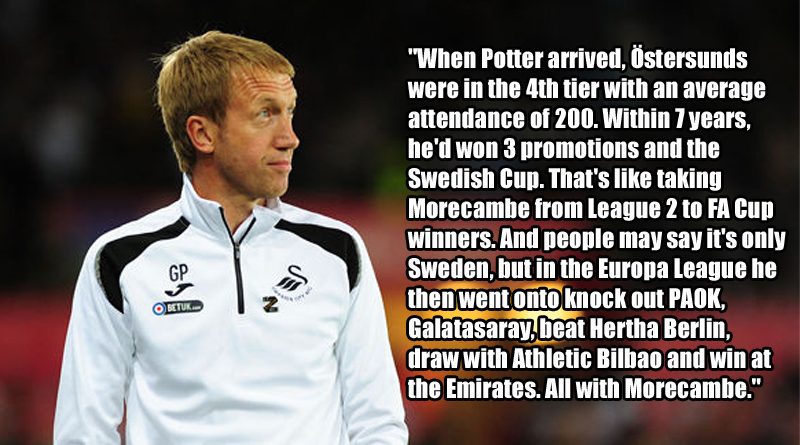Who is Graham Potter and what will he bring to Brighton?
Unless you are a football anorak, then you’d probably never heard of Graham Potter until February 2018. It was only when his Swedish minnows Östersund drew the might of Arsenal in the Europa League that most of us became aware that there was a young English coach performing miracles in Scandanavia.
In his playing days, Potter was a full back who worked his way through 11 clubs across every division of English football. He started out at Birmingham City, working his way through Wycombe Wanderers, Stoke City, Southampton, West Bromwich Albion, Northampton Town, Reading, York City, Boston United, Shrewsbury Town and Macclesfield Town who were his final club before retiring in 2005.
After his playing career came to an end, he completed a degree in social sciences and followed that up with a masters in leadership and emotional intelligence. He coached at both Hull and Leeds Metropolitan Universities and was technical director for the Ghana women’s team at the 2007 FIFA Women’s World Cup.
Then, in 2010, he was appointed manager of Östersunds on the recommendation of Swansea City‘s assistant manager Graeme Jones, who had played with Potter at Boston. Jones already had close links with the club having been out to Sweden to work with their young players before convincing Roberto Martinez to take the Swans there for pre-season tours when he was number two to the Spaniard at the Liberty Stadium. Östersunds were looking for a new boss and so Jones told their chairman to take a punt on this bloke coaching university football in England.
That proved to be a decision that neither side regretted. When Potter arrived in Sweden, Östersunds were in the fourth tier with an average attendance of 200. Within seven years, he’d won three promotions, finished fifth in the top flight and won the Swedish Cup. That’s like taking Morecambe from League Two to FA Cup winners. And people may say it’s only Sweden, but in the Europa League he then went onto knock out PAOK, Galatasaray, beat Hertha Berlin, draw with Athletic Bilbao and win at the Emirates. All with Morecambe.
When you delve a little into Potter’s success with Östersunds, it becomes pretty clear that he is no ordinary manager. Some of his methods would raise eyebrows in plenty of quarters, but then so did Arsene Wenger banning ketchup from the Arsenal canteen when he rocked up on these shores in 1996.
As you might expect from a man with a masters in leadership and emotional intelligence, these methods involve tapping into the human element of football. Potter believes that taking players, coaches and even the manager out of their comfort zones helps them to grow, build confidence and self esteem and increase a team’s ability to work together. If you can perform Swan Lake in front of 500 of your supporters, then you can easily go and beat Arsenal away from home. Östersunds did both.
The Swan Lake story is fascinating. So good was the end result, performed to a sold out crowd, that Potter and his squad got a standing ovation from the audience. Seeing Glenn Murray, Shane Duffy and Maty Ryan starring in a performance of Don Quixote at the Theatre Royal next year is worth appointing Potter for alone.
This cultural development of players isn’t just restricted to ballet. Östersunds have held a gala of solidarity with refugees in which the players listened to stories from some of society’s most vulnerable and then performed a concert. Potter opened things up by singing the Lapland national anthem in a local dialect, as you do.
Before the Swedish Cup final against IFK Norrköping, Potter handed his players two letters. One was from himself, detailing how proud he was of them. The other came from their families and had pretty much the same message. The point was to hammer home what a special opportunity they had in front of them and they duly responded by winning 4-1 to give Östersunds their first major trophy.
Take a look through Potter’s Östersunds squad and you’ll see why Tony Bloom thinks he is the man for Brighton. It’s a side that is littered with players discarded or unloved by other clubs for one reason or another, who finally fulfill their potential once Potter has got his hands on them. He gets the absolute maximum out of everybody who he works with, a particularly healthy trait if you are a Premier League club with one of the lowest budgets in the division.
Potter has taken several young Englishmen from non-league football and put them on a path to glory. Curtis Edwards tumbled from Middlesbrough to Thornaby of Northern League Division Two before finding himself scoring against Bilbao in the Europa League. Jamie Hopcutt’s Wikipedia entry lists York, Whitby Town, Stokesley, Ossett Town and Tadcaster Albion before he arrived in Sweden.
The same is true of his time at Swansea. At the Liberty Stadium, Potter has worked with a severely reduced budget as the Swans look to adjust to life outside of the Premier League. When the summer transfer window closed, he had only one senior centre back in Mike van der Hoorn. Over the course of his year in charge of the Swans, 17 players have left. As a result, he’s had to find bargains and polish young players from the academy, which makes their 10th place finish in the Championship so impressive.
Striker Oliver McBurnie has hit 22 goals for the Swans after none in his previous three seasons due to limited opportunities. Potter saw a useful, young striker and turned him into a 20-goal-a-season player. Matt Grimes has gone from four league games in four seasons to being involved in all 46 of Swansea’s Championship fixtures in 2018-19.
And you probably don’t need any introduction to Daniel James, who has scored five times and registered 15 assists since being given his debut by Potter. Oh, and he’s now attracting the attentions of Manchester United and is a full Welsh international – one of four players given their break by Potter who have since been called into Ryan Giggs’ Wales squad.
Whilst Chris Hughton gave just two academy products league debuts in four-and-a-half-years and those were only brief substitute appearances, Potter’s record suggests that he’ll have no issue trusting in young talent. Given that the Under 23s finished third in Premier League 2 this season and that we’ve chucked millions of pounds at talent for the development squad, there must be some good players in there. With Potter in charge, the likes of Aaron Connolly and Viktor Gyokeres may finally get a chance to at least push for the first team squad which it seems unlikely would ever have been afforded them by Hughton.
When you look at how much money Bloom is throwing at the academy and the training ground, it’s no surprise he has turned to a manager with such an excellent record of youth development. Swansea had the youngest starting XI by average age in the Championship this season – we had the third oldest in the Premier League. Only Yeovil Town gave more minutes to players under the age of 23 than Swansea in the entire country. Potter’s improvement of players may even extend to the likes of Jurgen Locadia and Alireza Jahanbakhsh, who have so far proven to be expensive and disappointing flops.
As for playing style, Potter uses that word ‘philosophy’ a lot. He wants his sides to play a certain way, which could well prove to be at odds with the win-at-all-costs attitude of the Premier League, where Big Sam Alardyce and his pint of wine or Tony Pulis and his baseball cap get parachuted in by most clubs at the first sign of trouble.
It’s that ‘philosophy’ that has underpinned his success so far though. Passing football, positive football, attacking football. A quick search through Twitter of Swansea goals this season under Potter throws up several passing moves that, had they been scored by Barcelona, you’d see played on highlight reels for years to come. There’s a 35 pass move going through 10 players against Queens Park Rangers, an 11 pass, two-touch move from goalkeeper at one end to McBurnie at the other against Reading. It’s brilliant to watch.
1⃣0⃣ players
9⃣0⃣ seconds
3⃣5⃣ passes and GOAL!!!The Swansea way…👏👌 pic.twitter.com/y3Asdyr908
— Swansea City AFC (@SwansOfficial) October 1, 2018
No wonder clubs are lining up to talk to Swansea manager Graeme Potter when he gets his teams playing football like this 🤤 pic.twitter.com/IR1Cre8hBq
— Soccer AM (@SoccerAM) May 18, 2019
The big question is, will it work in the Premier League? Playing in such a way, taking an extra pass rather than going long does mean that mistakes will be made but Potter actively encourages that – how can his players learn otherwise? At Östersunds, he had the time and backing to build that up over seven years.
Swansea are a club who used to be famed for their philosophy under Martinez, Brendan Rodgers and Brian Laudrup. Their supporters were only too pleased to have a man bringing some semblance of normality back, at the same time appreciating the excellent job in difficult circumstances that Potter did. He was building for the future there too, which is why Swans fans are so disappointed to see him go.
It will be interesting to see whether there is the same patience at the Amex. The Albion fan base seems to be becoming more impatient with each passing season, whether it be complaining about negative football or booing substitutions that they don’t agree with. How will the crowd react when Dale Stephens or Solly March make a mistake after trying something new, or Potter’s passing style means Martin Montoya rolling it back to Maty Ryan? Potter will get the time he needs from Bloom, but will he from the fans?
He deserves to. What we’ve got is a young manager who seemingly wants to play football on the front foot. He’s got clubs punching above their weight whilst working on tight budgets by trusting in young players and improving them immeasurably. He’s also used some pretty wacky ideas to eke the best out of more senior players who may have under performed in the past.
It isn’t hard to see why Bloom thinks he is the perfect fit for a club with a squad who have scarcely showed the talent to match the £70m that they’ve cost to put together. And one who has one of the finest training grounds in the land, the third best Under 23 squad in the country and a new Technical Director whose expertise is in getting players from age group football into senior football.
If Potter can take Morecambe to the Europa League, imagine what he can do with Brighton. Then, everyone will know his name.




